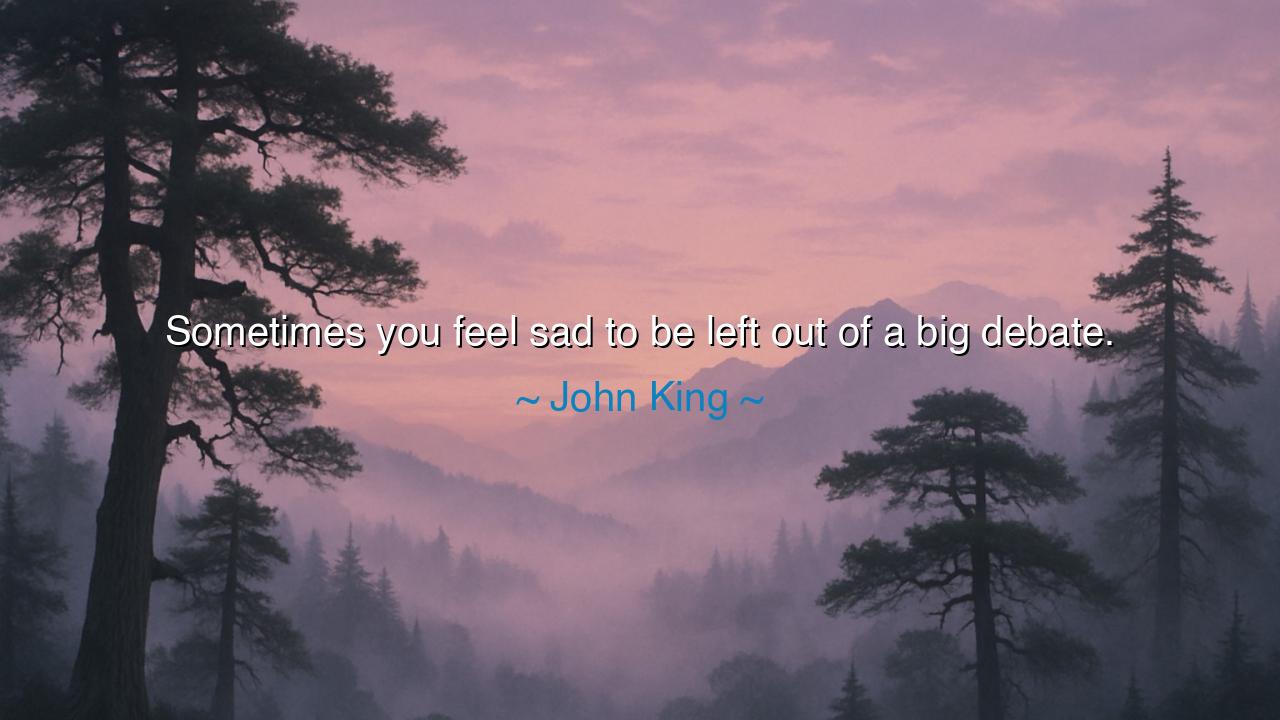
Sometimes you feel sad to be left out of a big debate.






John King once said, with quiet honesty and the humility of a seasoned observer: “Sometimes you feel sad to be left out of a big debate.” These words, though simple in form, carry the deep ache of human longing—the desire to belong, to be heard, to stand in the circle where ideas clash and truth is born. For in every age, the heart of humanity has yearned not merely to exist, but to matter—to have one’s voice woven into the great tapestry of discourse and destiny. To be left out is not merely to miss a conversation; it is to stand outside the fire of life, watching others shape the world while your own thoughts remain unspoken.
The ancients understood this feeling well. In the agora of Athens, where philosophers and citizens gathered to argue, question, and refine their understanding of justice, virtue, and the soul, there were always those who stood at the edges—listeners rather than speakers. Some, too timid to speak; others, too silenced by rank or fear. To be excluded from debate was to be denied participation in truth itself. Yet John King’s lament is not one of bitterness, but of recognition. It is a reminder that to be left out of great discussions wounds the spirit, for the mind, like the heart, is meant to commune with others.
Consider the story of Cassandra, the prophetess of Troy, cursed by Apollo to speak the truth but never to be believed. She saw the doom of her city, the fall of heroes, the burning towers—but no one would hear her voice. Her tragedy was not that she lacked vision, but that her voice was left out of the great debate that decided the fate of nations. In her silence, truth itself was exiled. So too in our world, when voices are ignored—whether through pride, politics, or prejudice—the world grows poorer, less wise, less whole.
Yet there is also a sacred sadness in being left out—a sadness that refines the soul. For in the quiet of exclusion, one learns the discipline of listening. The one outside the debate can see what those within cannot—the patterns, the folly, the pride that blinds the contenders. Many times in history, the greatest wisdom has come not from the shouting crowd but from the silent witness. It was in exile that Dante wrote of heaven and hell; it was in solitude that Spinoza found the geometry of God. To be left out, then, is not always a curse—it can be the preparation for deeper sight.
Still, we must not grow comfortable in silence. The feeling of sadness that John King describes is the soul’s reminder that participation is essential to the human condition. To stay forever outside is to deny one’s calling as a thinker, a doer, a voice among the living. The wise man does not wait endlessly for invitation; he builds his own forum, however small, and speaks truth with courage. For every big debate begins with a single voice that dares to rise. To feel sadness is natural; to let it silence you is defeat.
Thus, the lesson of King’s words is twofold. When you are excluded, let the sadness teach you empathy for others who are unheard. When you are included, let humility guide you so that no one else is cast into the shadows. The great debate of life is not meant to be a stage for pride but a circle for shared discovery. In lifting others into the dialogue, we honor the divine order that made humanity a community of voices, not a hierarchy of noise.
So, children of thought and seekers of truth, remember this: there will be days when your words are not wanted, when your wisdom is overlooked, when your voice echoes unheard. Do not despair. Let that sadness kindle a deeper resolve. For every era has need of those who wait patiently, who listen deeply, and who speak when the world has forgotten how to hear. And when at last your time comes to join the big debate, let your words be not of bitterness, but of clarity, born from the silence that once seemed to cast you out. In that moment, your voice will not merely enter the debate—it will elevate it.






AAdministratorAdministrator
Welcome, honored guests. Please leave a comment, we will respond soon